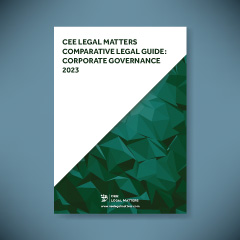Contributed by Guleryuz & Partners.
1. Corporate Structure Of The Companies
1.1. General Legal Framework
Joint stock companies (JSC) and limited liability companies (LLC) are two of the most commonly used company types among those regulated by the Turkish Commercial Code No.6102 (TCC). Under the TCC, the corporate bodies vary depending on the company types or whether the company is a publicly held or private one. Therefore, there is no differentiation in terms of corporate bodies between small, mid-sized, and large companies. Additionally, for publicly held companies, special committees are required to be formed as explained further in Section 3.2.
In JSCs, the required bodies are the board of directors (Board) and the general assembly of shareholders (GA). The authority of the Board arises from the TCC and the articles of association of the respective company that is required to be registered with the relevant trade registry during registration of the respective JSC. Pursuant to Article 365 of the TCC, the JSC is managed and represented by the Board. On the other hand, in the LLCs, instead of a Board, a board of managers manages and represents the company.
In both types of companies, the GA consists of shareholders and may only decide upon matters that are listed under the TCC such as the election of the members of the Board or board of managers, their removal, the distribution of profits and dividends, and the amendment of articles of association. To summarize, for both company types, the duties of the GA are parallel.
It should be noted that although it is not the rule, we see that in practice, companies that have larger capital and more sizeable transactions either qualitatively or quantifiably are established as JSCs, whereas the remaining are established as LLCs.
There is no requirement for a minimum number of shareholders. Thus, both JSCs and LLCs can be established by one shareholder as per Article 338 of the TCC for a JSC and Article 573 of the TCC for an LLC for them to be established.
Although there are no special requirements in terms of being a shareholder in principle, such requirements and criteria may be determined via the articles of association. As there are no legal restrictions, both real persons and legal entities can be shareholders.
According to Article 329 paragraph 2 of the TCC, shareholders of JSCs are only liable to the company with the capital they have committed. In LLCs, in addition to the capital they have committed, shareholders may also be liable for additional payments if it is stipulated in the articles of association. However, the additional payment liability is regulated in the Article 603 of the TCC where some conditions are set regarding the financial situation of an LLC. The limited conditions regulated in the relevant article are as follows:
- when the sum of the company’s basic capital and legal reserves cannot cover the loss of the company,
- when the company cannot operate properly without these additional payments, or
- in any other circumstance specified in the articles of association that necessitates equity.
An additional payment obligation can only be established as a specific cash amount and this sum cannot be greater than double the capital’s nominal value that is stated in the articles of association.
Additionally, the shareholders of LLCs are also directly liable in proportion to their capital shares for the public receivables that cannot be collected from the LLC as per Article 35 of Law No. 6183 on the Procedure of Collection of Public Receivables. Such liability for public debts does not exist for the shareholders of JSCs.
The provisions regarding the classification of enterprises and companies according to their scales are regulated in Articles 1522 and 1523 of the TCC. In accordance with Article 1522, the criteria as to whether enterprises are to be considered small, mid-sized, or large are determined via regulations by the Turkish Ministry of Customs and Trade. Pursuant to Article 1523, the criteria determined for small, mid-sized, or large enterprises are also valid for both LLCs and JSCs. Under Article 5 of the Regulation on the Definition, Qualification and Classification of Small and Mid-Sized Enterprises No. 2005/9617, enterprises are classified as follows:
- Micro Enterprise: Enterprises employing less than 10 employees and whose annual net sales revenue or financial balance sheet do not exceed TRL 5 million.
- Small Enterprise: Enterprises employing less than 50 people and whose annual net sales revenue or financial balance sheet do not exceed TRL 50 million.
- Mid-Sized Enterprise: Enterprises employing less than 250 people and whose annual net sales revenue or financial balance sheet do not exceed TRL 250 million.
Companies that exceed the criteria set above for mid-sized enterprises are considered large-scale enterprises/companies. However, the following companies are regarded as large-scale enterprises/companies irrespective of meeting the criteria set above:
- Banks, of which one of the principal areas of activity is to preserve assets in the capacity of trust for a large group of persons,
- Investment banks,
- Insurance companies, and
- Pension companies and similar companies.
1.2. The Function of the Supervisory Board
The TCC system is built on a single-tiered board structure. Thus, there is no division as a separate supervisory and executive board. However, the TCC has a flexible regime in this regard and allows the establishment of a two-tiered board structure. As such, Article 367 of the TCC regulates the transfer (delegation) of management to some Board members and/or third persons. Thus, with the provisions of paragraph 2 of Article 367 and Article 370 of the TCC, it is possible to form a supervisory board in accordance with a dualist approach. These explanations also apply to a board of managers in LLCs.
Especially in large-scale companies, an executive board is preferred with the transfer of authority, since it enables the company’s business to be carried out more effectively, efficiently, and easily.
Further, in the Corporate Governance Principles (Annex I of Corporate Governance Communique (Corporate Governance Communique) issued by the Capital Market Board (CMB) (serial II, No. 17.1) dated January 3, 2014) it has been regulated that the chairman of the Board and the chief executive officer should be different persons on the grounds that the management should not remain in the hands of a single person, creating an omnipotent decision maker. Pursuant to the Corporate Governance Principles, if these titles are bestowed upon a single person, such should be disclosed on the Public Disclosure Platform (Kamuyu Aydınlatma Platformu (KAP)) together with its reasons.
According to Article 369 of the TCC, Board members must manage and represent the company with care and commitment. This is an objective duty of care, and it indicates that the Board member’s duty of care extends beyond the care they exercise in their personal affairs. Thus, they are expected to operate with the same care and caution as a careful and prudent manager in a similarly qualified company under similar circumstances. As an extension of the duty of care, Board members are under the obligation of confidentiality, in other words, Board members cannot disclose information that is discussed in meetings or acquired outside the meeting as part of their duty. The same principles apply to the members of both the executive board and supervisory board in the case of a two-tiered board structure.
Board of managers members’ degree of care is different than that of Board members. According to Article 626 of the TCC, managers have to perform their duties with due care, have to safeguard the interest of the company in good faith, and are obliged with a duty of loyalty. Thus, while Board members’ duty of care is evaluated based on being a prudent manager, members of the board of managers are not subjected to such an analogy.
1.3. Function of the Executive Board
As mentioned in Section 1.2., there is no distinction between supervisory and management bodies under Turkish law in principle and the duties of the supervisory board are fulfilled by the Board.
According to the TCC, the senior management of the company, the determination of the company’s management organization, and the establishment of the necessary order for financial planning are non-transferable duties both for the Board and the board of managers.
The Board is the body that ensures the implementation of corporate governance principles in practice. The Corporate Governance Principles state that the Board’s primary responsibility is to manage and represent the company by maintaining the risk, growth, and return balance at the most appropriate level, using a logical and responsible risk management approach, primarily by taking the company’s long-term interests into consideration. The Board establishes the company’s strategic goals, labor, and financial resources it will need and evaluates the management’s effectiveness.
It is sufficient for both the Board and board of managers members to possess full capacity and power of discernment to fulfill their obligations and duties regulated under the TCC and applicable laws and regulations. However, additional special requirements regarding the members of the Board/board of managers may be stipulated by the articles of association.
Real persons and legal entities can be board members in both JSCs and LLCs. If a legal entity becomes a board member, a real person representative should be assigned in order to attend board meetings, vote, and sign on behalf of the legal entity. Additionally, there are no nationality restrictions in the TCC.
1.4. Conflicts of Interest and Related Party Transactions
There are numerous articles stipulated under the TCC that regulate the obligations of the members of the Board and board of managers to avoid conflicts of interest and related party transactions. Relevant articles for Board members are as follows:
- Board members are obliged not to compete with the company. Accordingly, Board members cannot carry out a commercial transaction that falls within the scope of the company’s business, on behalf of themselves or someone else, without the permission of the GA (Article 396 paragraph 1 of the TCC).
- Board members cannot perform transactions with the corporations, on behalf of themselves or anyone else without the permission of the GA (Article 395 paragraph 1 of the TCC).
- Non-shareholder Board members and their non-shareholder relatives are prohibited from borrowing cash from the corporation. The company cannot provide security, guarantee, or collateral to the aforementioned persons, and cannot assume liability or take over the debts of those persons (Article 395 paragraph 2 of the TCC).
- Board members cannot attend meetings in certain cases. Accordingly, a Board member cannot attend a meeting on matters where their personal interests or the personal interests of one of their descendants, spouse, or blood relatives up to the third degree, including the third degree, conflict with the interests of the company (Article 393 of the TCC).
In addition to these obligations, it is regulated in the Corporate Governance Principles that the company shall not loan money, make credit available, enlarge the term of the loan money or credit, improve conditions, make credit available via a third party as personal credit, or grant securities such as surety to any of its Board members.
Article 17 paragraph 3 of the Capital Markets Law No.6362 (CML) regulates related party transactions. Accordingly, any related party transactions of publicly held companies that exceed the thresholds of 5% and 10% of the overall revenue of such company require a Board decision. With it exceeding each threshold, additional obligations such as valuation, an affirmative majority of independent Board members in the decision establishing the fundamentals of the transaction, and potential GA approval may also be necessary.
In the case of an LLC, managers are restricted from engaging in any activity that may put them in competition with the company. However, it is expressly stipulated that the non-compete rule is not absolute and may be repealed by the GA (Article 626 paragraph 2 of the TCC).
1.5. Legal Framework for Large Companies
There are no specific provisions regarding the mandatory bodies of large companies regulated under the TCC except as explained in Section 3.1. and 3.2., where banks and publicly held companies must establish mandatory committees. Please refer to the relevant sections for further details.
2. Corporate Governance Framework
2.1. Transparency and Public Disclosures
According to Article 1524 of the TCC, capital companies subject to independent audit are required to launch a website within three months from the date of registration of their company with the trade registry. In general, the following information should be published on such companies’ websites: commercial name, names of the chairman and members of the Board/board of managers and the auditor, and GA minutes.
In addition to the above, for publicly held companies, according to the Corporate Governance Principles, the corporate website shall include trade registry information, up-to-date information about the shareholder and management structure, detailed information about privileged shares, the final version of the companies’ articles of association together with date and numbers of the Turkish Trade Registry Gazette in which amendments are published; financial statements, annual reports, prospectuses and other documents for public disclosure, agendas of the GA meetings, lists of attendees and meeting minutes, the form of proxy voting at the GA meeting, mandatory information forms prepared for a tender offer or proxy solicitation and similar forms, companies’ policy for buy-back if any, the policy of dividend distribution, ethic rules adopted by the company in addition to the information that must be disclosed in accordance with the applicable laws. In this respect, a minimum of five years’ worth of information on the aforementioned matters must be available on the company’s corporate website. In addition to these, questions and complaints received by the company and responses to them must be available on the website under the frequently asked questions section and relevant information on the website must be prepared additionally in foreign languages for the use of foreign investors.
According to paragraph 2 of Article 422 of the TCC, the Board/board of managers is obliged to register and announce the notarized copy of the GA decisions at the Trade Registry Directorate. Not all matters are registered and announced, and the matters that need to be registered and announced mainly include structural changes (such as a de-merger, merger, or change of company type), amendments to the articles of association (Article 455 of the TCC) together with capital increase and decrease decisions (respectively Articles 456 and 473), address changes, the appointment of the members of the Board/board of managers and their term of duty, the appointment of the independent auditor.
As mentioned in Section 2.1., GA minutes must be also published on the company’s corporate website.
The TCC does not stipulate a rule requiring the public disclosure of all Board/board of managers decisions. However, according to Article 373 of the TCC, the Board/board of managers should submit the notarized copy of their decision that identifies the person authorized to represent together their authorities to the Trade Registry Directorate for registration and announcement. In addition to the abovementioned rule, the internal directive prepared by the Board/board of managers, which comprises the rules regarding the GA’s working principles and procedures is also registered at the Trade Registry Directorate and announced according to Article 419 of the TCC. Also, if the JSC adopted the registered share capital system, the Board decision approving the share capital increase must be registered and announced.
2.2. Public Authorities Responsible for Monitoring Corporate Governance
According to Article 17 of the CML, the CMB is responsible for determining the corporate governance principles for publicly held corporations.
Additionally, the Banking Regulation and Supervision Agency (BRSA) sets corporate governance rules for banks and financial institutions.
The Public Oversight Accounting and Auditing Standards Authority (Kamu Gozetimi Muhasebe ve Denetim Standartlari Kurumu (KGK)) is a regulatory and supervisory government agency established in Turkey to protect the public interest regarding accurate and independent preparation of audit reports, to provide accurate, reliable, and comparable financial information, and to oversee the audits of large-scale companies, including listed companies, banks, and insurance companies.
The Corporate Governance Communique and the Corporate Governance Principles and its annex, are the main regulations regarding corporate governance. The respective principles apply only to public companies having their shares traded on the stock exchange and companies which are considered as publicly held as per the law. It should be noted that most of those principles are advisory, and not mandatory.
Additionally, there is the Communique on the Corporate Governance Principles of Banks dated November 1, 2006, regarding the corporate governance of banks.
2.3. ESG
Non-financial reports mainly evaluate the transparency, environmental, and social obligations of companies, and they are presented to the stakeholders. There is no legal regulation on non-financial reporting in Turkey. Having said that, since financial reports can no longer satisfy the investor’s information needs, companies are turning to alternative reporting methods. Therefore, non-financial reporting is increasing day by day.
Currently, there is no public authority in Turkey responsible for setting standards for non-financial reporting and disclosures.
2.4. Internal Controls and Fraud Measures
In accordance with the Decree on the Determination of the Companies Subject to Independent Audit, the following companies are subject to independent auditing:
- Companies included in List I attached to the decree,
- Companies whose capital market instruments are not traded in a stock exchange or other organized markets, but are considered publicly traded within the scope of the CMB, and
- Companies included in List II attached to the decree.
For these companies, such criteria and threshold values are also regulated separately. Accordingly:
1. Companies in List I attached to the decree are subject to independent auditing regardless of any criteria.
In the attached List I, companies are listed under a total of six separate headings, such as investment institutions, portfolio management companies, valuation institutions, banks, and factoring companies. It is regulated that these companies are subject to independent audits without being bound to any criteria.
2. The following threshold values are foreseen for companies whose capital market instruments are not traded on a stock exchange but are considered publicly traded within the scope of the CMB.
- Total assets of TRL 30 million,
- Annual net sales revenue of TRL 40 million, and
- 50 employees.
Those who fulfill at least two of the criteria in two consecutive accounting periods are subject to independent audit as of their following accounting period.
3. The following threshold values are foreseen for the companies specified in List II attached to the Decision.
- Total assets of TRL 60 million,
- Annual net sales revenue of TRL 80 million, and
- 100 employees.
Those who fulfill at least two of the criteria in two consecutive accounting periods are subject to independent audit as of their following accounting period.
4. The threshold values for companies not covered by the above are as follows:
- Total assets are TRL 75 million,
- Annual net sales revenue of TRL 150 million, and
- 150 employees.
Those who fulfill at least two of the criteria in two consecutive accounting periods are subject to independent audit as of their following accounting period.
Independent audit reports are also published on the company’s website together with the financial reports.
Internal audit is related to the assurance of independent and objective activity and contributes to the efficiency of corporate governance. According to Article 29 of the Banking Law No. 5411 (BankL.), banks are required to form an internal audit mechanism with the assistance of the Board. In a nutshell, this internal audit mechanism should govern all units, branches, and partnerships of a bank. In this framework, the bank inspectors audit the banking activities whether they comply with the legislation, internal regulations, and banking principles.
Under Article 29 of the BankL., it is clearly regulated that the internal audit activities are carried out impartially and independently with due professional care. In this respect, the internal audit report must be prepared and submitted to the Board via the audit committee at least once every quarter.
The Regulation on Internal Systems of Banks also sets the Board’s responsibilities for selecting the audit committee. Various restrictions on who may represent the committee are contemplated under Article 6 of the BankL, some of which are as follows:
- Not being among the Board members who have executive duties in the bank,
- Not having qualified shares in the bank and partnerships subject to consolidation, and
- Prohibition on spouses or children holding the positions of general manager, assistant general manager, or other comparable positions within the bank.
3. Shareholder And Board Committees
3.1. What Committees Are Prescribed by Law?
There is no regulation that obliges companies to establish committees, except in the case of publicly held companies. Mandatory committees for publicly held companies are explained in detail in Section 3.2. In addition, pursuant to Article 24 of the BankL., it is obligatory to establish an audit committee to assist the Board in carrying out their audit and surveillance activities.
Even though it is not mandatory by the TCC, the Board of privately held/closed companies or the board of managers may also establish committees to monitor its business more effectively, conduct internal audits, or implement certain Board decisions.
3.2. What Committees Are Mandatory for Large Companies?
The following committees must be established by the Board for publicly held companies to effectively carry out their obligations in accordance with the Corporate Governance Principles governed by the CMB:
1. The Audit Committee is in charge of the supervision of the company’s accounting system, public disclosure of the financial information, independent auditing, and the operation and efficiency of internal control and internal audit system. Election of the independent audit institution, initiation of the independent audit process by preparing the contracts of independent audit, and the work of the independent audit institution at all levels shall be conducted under the supervision of the audit committee. The independent audit institution and the service to be purchased from this institution shall be determined by the audit committee and submitted for the approval of the Board.
2. The Corporate Governance Committee is in charge of determining whether the principles of corporate governance are applied. If not, it is among the duties of the committee to determine the reason for non-implementation and give advice on such issues to the Board in order to improve corporate governance.
3. The Nomination Committee is in charge of the establishment of a transparent system for the identification, evaluation, and training of suitable candidates for management positions with administrative responsibility, and to work on determining policies and strategies in this regard.
4. The Early Detection of Risk Committee is responsible for the early detection of risks that may endanger the existence, development, and continuation of the company, by taking the necessary precautions regarding the risks identified, working to manage the risk, and reviewing the risk management systems at least once every year.
5. The Remuneration Committee is in charge of the designations of the principles, criteria, and implementations to be used in the remuneration of the Board members and the executives by considering the long-term targets of the company and supervision thereof and submits its advice with respect to the remuneration of the Board and the executive managers while considering the achievement level to the criteria used in remuneration.
However, according to the Corporate Governance Principles, the corporate governance committee may also perform the duties of the nomination and remuneration committees if they have not been established independently due to the Board’s organizational structure.
3.3. Remuneration of Supervisory and Executive Board Members
It is not mandatory to establish a Remuneration Committee in JSCs and LLCs. As stated in Section 3.2., even publicly held corporations are not required to have a Remuneration Committee.
Under the TCC, the remuneration of members of the Board/board of managers members is not mandatory. However, according to Article 394 of the TCC, if the amount is determined by the articles of association or a GA decision, members of the Board/board of managers can be paid in the form of the attendance fee, salary, bonus premium, or a share of the annual profit. However, certain requirements have been stipulated under Article 511 of the TCC regarding the remuneration of Board members. In this respect, dividends may be given to Board members only after a certain allocation is made for the legal reserve and after the dividend is distributed to the shareholders at the rate of 5% of the paid-in capital or at a higher rate stipulated in the articles of association.
While the remuneration of Board members is clearly regulated in Article 394 of the TCC, no similar regulation has been adopted for the board of managers’ members. However, in Article 616 of the TCC, it is regulated that the salaries of members of the board of managers will be determined by the GA.
The equal treatment principle prevailing in the TCC has no application in terms of remuneration. Accordingly, different payments can be made to the members of the Board and board of managers depending on their experience and contribution to the company.
In the Corporate Governance Principles, it is regulated that the financial rights provided to Board members will be determined as a result of an evaluation based on performance. In the remuneration of independent board members, share acquisition plans or payment plans based on the company’s performance cannot be taken into account according to the Corporate Governance Principles. In addition, the amount of remuneration for the said members must be at a satisfactory level to protect their independence.
Pursuant to the TCC, the determination of the remuneration of the members of the Board and the board of managers is one of the non-transferable duties of the GA. As mentioned in Section 2.1., GA meeting minutes must be registered under the Trade Registry Directorate and announced in the Trade Registry Gazette. These explanations are also valid for the remuneration of the members of the board of managers.
Companies who are required to establish a website should publish their GA minutes on their website. Pursuant to the Corporate Governance Principles, remunerations and all other benefits provided to the Board members and executives with administrative responsibility are disclosed to the public through the annual activity report.






